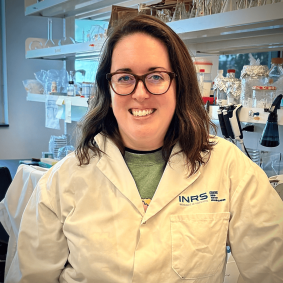Marie-Christine Groleau
Master's degree in applied microbiology (2006)
Research officer, INRS
"At university, you learn a lot of theory. But in the lab, everything falls into place. You finally understand what you've learned."
When Marie-Christine Groleau thinks back to her arrival at INRS, she smiles: “It was a bit of an accident,” she says. With a bachelor's degree in microbiology from the Université de Montréal, she discovered INRS through friends who had worked at the Musée Armand-Frappier, then adjacent to the Centre Armand-Frappier Santé Biotechnologie. Their enthusiastic stories, the laboratory visits, the stimulating environment... all pointed to the obvious: this is where she wanted to pursue her master's degree.
Quickly welcomed into a laboratory at the Centre Armand-Frappier Santé Biotechnologie, she immersed herself in a research environment where human contact is as important as scientific learning. "Doing research together brings people together. The support of colleagues, the friendships... most of the people I studied with are still my friends today," she confides. This atmosphere, even more intimate at the time, has left a lasting imprint on her personal and professional life.
Twenty years later, she's still here. A research professional in Professor Éric Déziel's laboratory, she never expected to make a career of it for so long. "Initially, that wasn't necessarily my goal. I thought it would be a good experience... Then, in the end, I never left." Here, she explores intercellular communication between bacteria and bacterial community life, while supervising students, coordinating projects and ensuring the smooth running of the laboratory. "I really enjoy being able to try out lots of things. Learning new methods, working on a variety of projects... that's what keeps me going."
This deep bond with INRS is matched by an attachment to place. "The Armand-Frappier campus is a really special environment. We're a bit isolated from the city, but it's a beautiful place to work. It's like a second home for me."
She has vivid memories of her apprenticeship there: "At university, in the baccalaureate, you learn a lot of theory. But in the labs, everything falls into place. You finally understand what you've learned." She stresses the importance of the freedom she was given at INRS, the freedom to try, to make mistakes, and above all, to learn. "That's what prepared me for everything I do today."
Her advice to current students? "Don't put too much pressure on yourself. Don't take failures personally. They're learning experiences." It's in these challenges that experience, and sometimes even the fondest memories, are forged.
As for the future, she hopes it will remain true to what she has always strived for: curiosity, novelty and pleasure. "I hope to continue to love what I do, to learn, and to never become jaded. May it continue to amuse me to discover new things."
[Interviewed in May 2025.]

